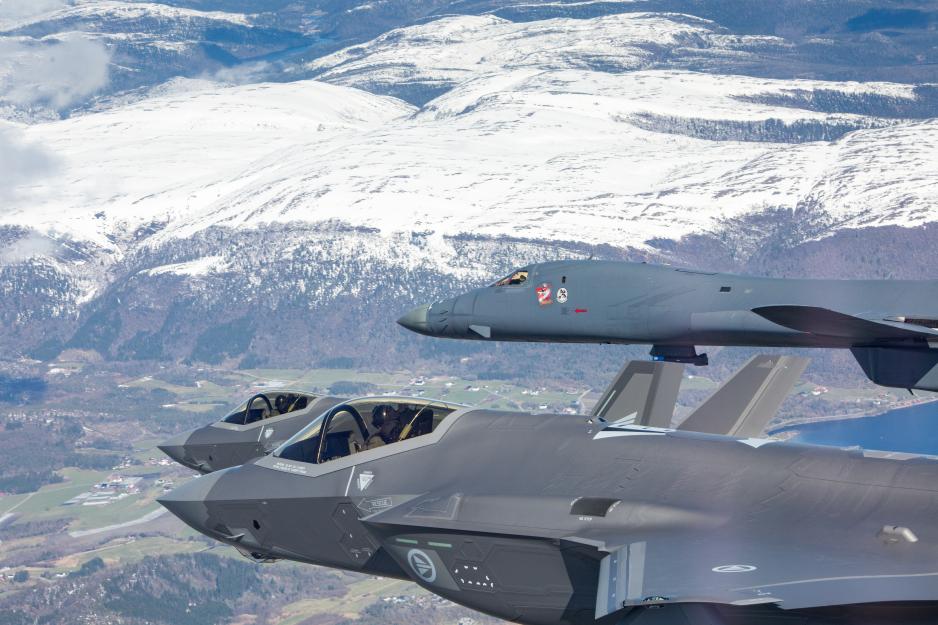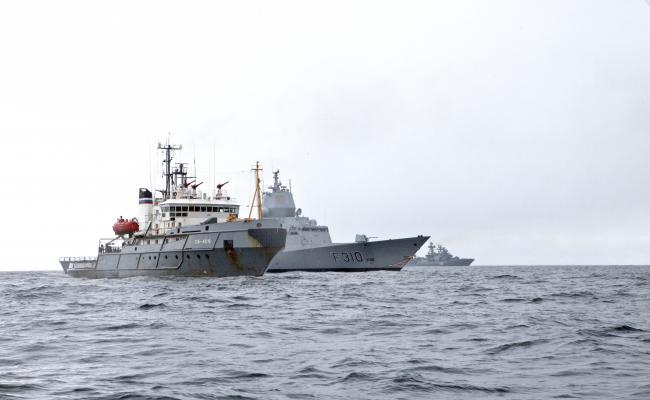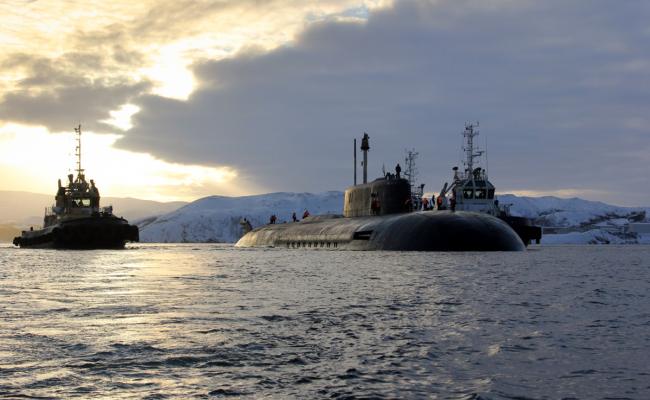Op-Ed: Stop inciting the ‘Cold War’ language in the Arctic

Two B-1B Lancer bombers fly in formation together with Norwegian F-35A fighters. (Photo: Bodø QRA 331 Squadron / Armed Forces).
"The Cold War framing of Arctic security issues must stop", says Dr Danita Catherine Burke of Centre for War Studies in Denmark.
High North News is not responsible for the content of external links.
The press is at it again; falsely comparing current Arctic relations to the Cold War. New threats, actors and issues make Arctic politics and security in the 21st century incomparable to the Cold War.
Most recent offender:
The Agence France-Presse (AFP) has published an article titled “Cold War vibes as US shows military muscle in Norway.”
In the piece the AFP presents the United States’ deployment of long range B-1 bombers to Norway as a Cold War style show of force. It presents the military escalation as the result of tensions with Russia due to the Crimea conflict.
However, later in the piece AFP quotes the Russian Senior Arctic Official to the Arctic Council and Ambassador at Large for Arctic Cooperation, Nikolay Korchunov.
"Nobody in the Arctic is preparing for an armed conflict. However, there are signs of mounting tension and military escalation...[the militarization] could turn us back decades to the days of the Cold War."
But the article puts a bit too much stock in the catchy ‘Cold War’ comment by SAO Korchunov.
New security dynamics and threats in the Arctic:
Firstly, Russia isn’t the Soviet Union. The vision of a return to a Soviet Union-level global geopolitical position for Russia may suit some Russian decision-makers. However, the politics of the 21st century are not conducive to such a turn of events.
Secondly, Russia isn’t the only actor that the Western Arctic states view as creating security challenges in the Arctic.
The Cold War framing of Arctic security issues must stop.
The growing global reach and ambition of China has changed the security equation. China isn’t going to go quietly into the night as Russia attempts to regain its former Soviet hegemonic status.
Thirdly, the AFP quotes from SAO Korchunov that there are a lack of ‘armed conflict’ preparations but military escalations which are causing tensions is correct, but AFP doesn’t do enough to connect the dots between the comments.
According to open sections of the Norwegian Intelligence Services, the Police Security Services and the National Security Authority 2021 threat and risk assessments, both Russia and China pose the largest intelligence threats against Norway and Norwegian interests. Canada echoes Norway’s concerns about China and Russia.
The Canadian Security Intelligence Service (CSIS) has spoken out against China and Russia. CSIS intelligence chief David Vigneault stated that Russia and China are “aggressively” targeting Canadians with China engaging in “activities that are a direct threat to our national security and sovereignty.”
Lastly, bipolarity defined the Cold War, but it isn’t the current situation in the Arctic region or global politics.
The lack of bipolarity doesn’t mean that the security challenges identified by Canadian and Norwegian intelligence agencies aren’t real or warranting responses. But framing the current geopolitical situation in the Arctic region in Cold War terms doesn’t properly explain what is happening now.
Other factors undermining the Cold War narrative:
The eight Arctic states - Canada, Finland, Iceland, Kingdom of Denmark, Sweden, Norway, Russia and the United States – have cooperated extensively since the end of the actual Cold War. The Arctic Council has facilitated constructive regional dialogue on environmental protection and regional development since 1996.
But, the AFP is correct. The Crimea conflict is a source of tension between Russia and NATO. However, the 2014 conflict in Ukraine is insufficient to example the 2021 presence of United States bombers in Norway for High North exercises. The AFP reference to Russia’s revamping of Soviet military installations isn’t new information either.
Norway and the United States have been allies for decades. Both are members of NATO. Trump shook NATO confidence in the United States’ commitment to its long-established alliances and security partnerships in Europe. Trump discussed pulling the US from NATO. The 2020 United States election changed everything.
Given the wider security concerns expressed about China and Russia, the US Air Force visit to Norway is a strong signal of the United States’ re-commitment to its NATO allies.
Also read
Move on! The Cold War framing of Arctic security issues must stop. The Cold War was a significant period in history, but it is history. Current security challenges impacting and influencing the Arctic have evolved since 1991. Admittedly, Russia remains a serious security player in the Arctic and poses challenges to NATO members.
China is also a rapidly growing global security actor. It is pushing Arctic state tolerance of its presence in the region. For example, a Chinese company’s 2018-9 attempt to secure the bid to build two Greenlandic airports is proof of China’s effort to expand its Arctic foothold.
The 21st century Arctic, however, isn’t experiencing a new Cold War. Different dynamics are developing with new security challenges emerging. By constantly framing the Arctic security issues in Cold War terms, though, is a distraction that is as unhelpful as it is antiquated.



